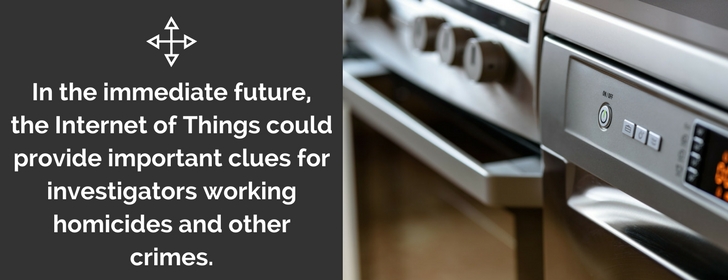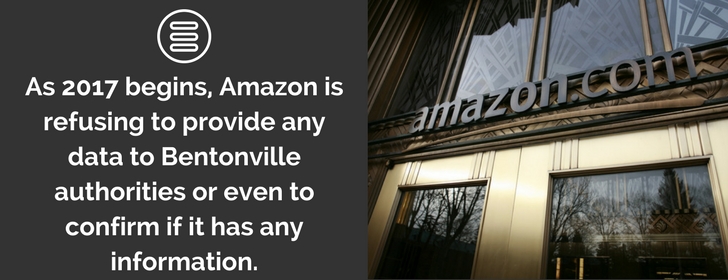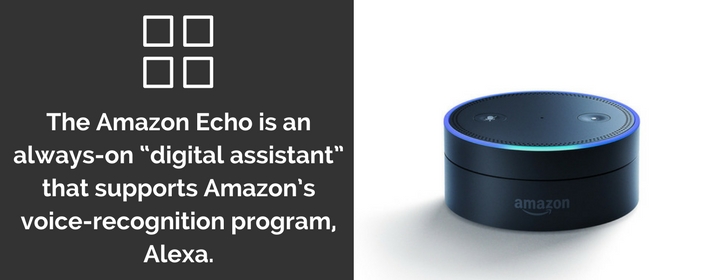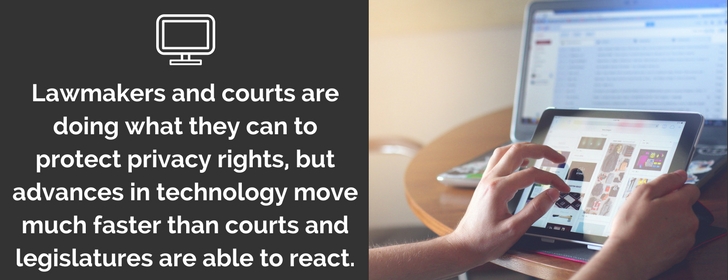High-tech refrigerators, toasters, and washing machines may soon be among the tools that detectives will use to solve crimes, according to London’s Daily Telegraph. They’ll be connected to the “Internet of Things.” According to Wikipedia, the Internet of Things is the internet-based networking of vehicles, buildings, appliances, even light poles, and other physical items laden with electronics, sensors, software, cameras, and connectivity that enables these items to gather and exchange information.
In other words, we are connecting almost everything to the internet so that almost everything can gather data and be remote-controlled. In the immediate future, the Internet of Things could provide important clues for investigators working homicides and other crimes. “All these leave a log and a trace of activity. The crime scene of tomorrow is going to be the Internet of Things,” according to Mark Stokes, speaking for London’s Metropolitan Police. Already, detectives on both sides of the Atlantic are currently being trained to look for gadgets that could provide a ‘digital footprint’ of victims, suspects, and persons of interest.
Doorbells are already commercially available that show you – in real time, on your smartphone – who’s knocking at your door. Wireless cameras in refrigerators and washing machines can record movements and the time of those movements. The new Samsung Family Hub Fridge, for example, even includes a camera that provides a live feed of the refrigerator’s contents, so shoppers can see what they need while they’re at the supermarket.
HOW WILL DETECTIVES OPERATE IN THE FUTURE?
Login times and dates will be able to provide alibis and to verify someone’s presence at a specific place and time. Mark Stokes predicts that detectives in the future will carry a digital forensics kit that will let them analyze microchips and download data immediately rather than having to confiscate items and take them to a police lab. However, law enforcement agencies that gather evidence from the Internet of Things will also likely face considerable legal opposition from electronics manufacturers worried about the privacy concerns of consumers.
That’s already happening in Bentonville, Arkansas, where police investigators are trying to obtain evidence regarding the 2015 murder of Victor Collins. When investigators learned that their main suspect in the Collins murder – a man named James Andrew Bates – owned an Amazon “Echo,” they quickly focused on determining if the device had recorded anything that might advance their investigation. Bentonville authorities obtained a warrant telling Amazon to produce any recordings it has from Bates’ Echo device.
According to court documents, James Andrew Bates is suspected of murdering Victor Collins in November 2015. The two had been drinking with two other friends at Bates’ home. One of the friends left, the other apparently fell asleep, and the next day Collins was found dead in the home’s hot tub, according to court records. The coroner ruled that strangulation was the cause of death. Bates has been charged with murder. As 2017 begins, Amazon is refusing to provide any data to Bentonville authorities or even to confirm if it has any information.
Kimberly Weber, an attorney for James Andrew Bates, argues that there is a “big problem that law enforcement can use the technology that advances our quality of life against us,” and Amazon has issued a statement that reads: “Amazon will not release customer information without a valid and binding legal demand properly served on us. Amazon objects to overbroad or otherwise inappropriate demands as a matter of course.”
However, Amazon’s Echo was not the only device that James Andrew Bates had connected to the Internet of Things. According to court records, his electronic water meter recorded that 140 gallons of water were used the night that Victor Collins died – all between 1:00 a.m. and 3:00 a.m. – possibly, police believe, to clean and wash away blood and evidence from the patio surrounding the hot tub.
HOW DOES THE AMAZON “ECHO” WORK?
The Amazon Echo is an always-on “digital assistant” that supports Amazon’s voice-recognition program, Alexa. Amazon says the Echo and the smaller Echo Dot exceeded sales expectations in 2016 with nine times as many sales as in 2015. Without providing precise numbers, the company says that “millions of new customers will be introduced to Alexa” as a result of holiday-season sales in 2016.
Lynn Terwoerds is the founder of the Voice Privacy Industry Group and is also an executive director of the Executive Women’s Forum on Information Security and Risk Management. She told USA Today, “The myth we must fight against with Echo is that it’s constantly listening in on you – it’s not. I understand that law enforcement would have an interest in any information that could help in a murder investigation, but it can be argued that this data would be of very limited use as compared to individual privacy rights.”
Marc Rotenberg is the president of the Electronic Privacy Information Center – EPIC – a Washington-based non-profit. Rotenberg insists that “there should be clear legal standards established for law enforcement access. And manufacturers should adopt techniques for data minimization and data deletion. Devices that retain data will be the targets not only of law enforcement officials but also criminal hackers.”
ARE YOUR RIGHTS AT RISK?
As technology moves forward, privacy is becoming harder to ensure, and the rights of suspects in criminal cases can be endangered. The City of Chicago, for example, is now placing sensors on light poles to monitor, photograph, and listen to what’s happening on the streets – the entire city is being connected to the Internet of Things. Advancing technology is making surveillances, searches, and investigations increasingly complicated. If you are arrested in New York or on Long Island, let an experienced Long Island criminal defense attorney review your case to determine if your privacy rights have been violated by the police.
Lawmakers and courts are doing what they can to protect privacy rights, but advances in technology move much faster than courts and legislatures are able to react. As the law struggles to keep up with technology, the rights of the individual can sometimes be overlooked. If you are charged with a crime, or if you simply need more information regarding your own legal rights, let an experienced Long Island criminal defense attorney provide the representation or legal advice you need.















Comments are closed.